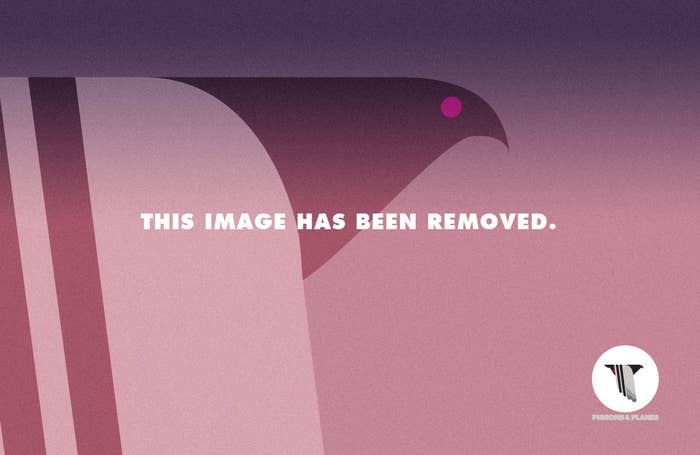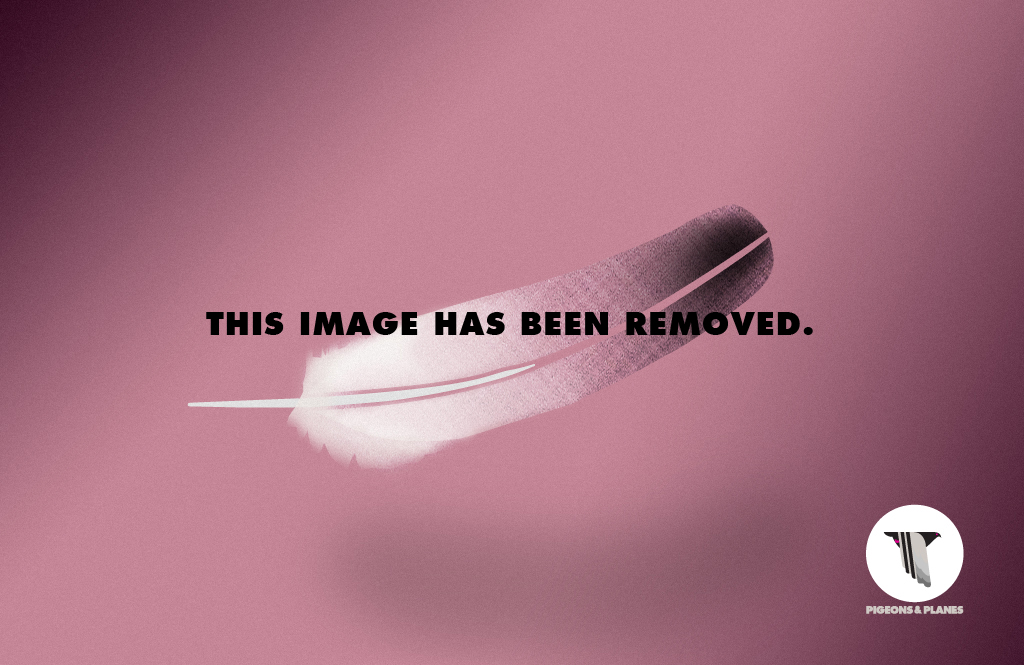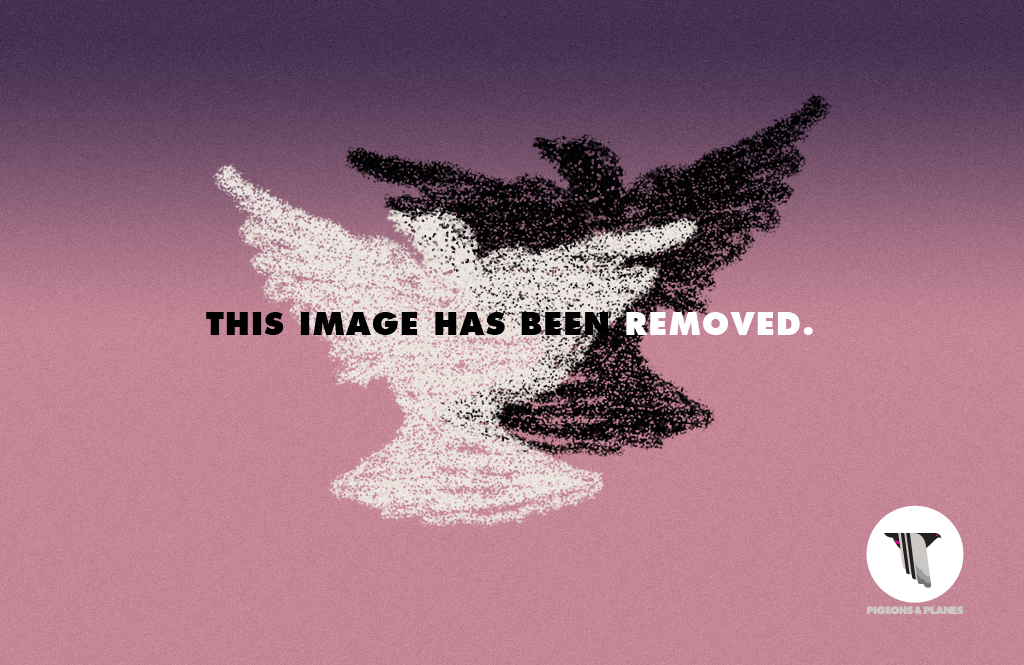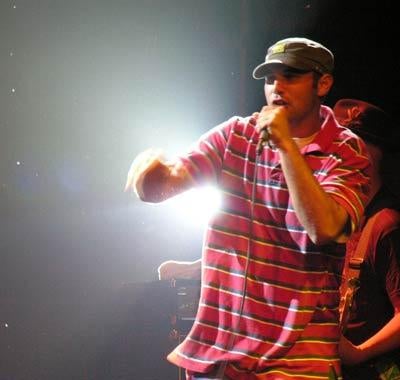1.

It’s not every day that one of our new favorite bands is discovered inside an email, but sometimes, someone will plop something special in our inbox that stands out. In this case, a publicist at Nasty Little Man (what’s up Dana!) sent us a note about a new group they are representing out of L.A., Electric Guest. And what piqued our interest was that their upcoming full length debut is produced by 2011 Grammy Award Producer of the Year winner Danger Mouse.
Okay cool, Danger Mouse. We love that guy’s music. The Grey Album was genius. Gnarls Barkley was the shit. The Broken Bells project was awesome. His stuff with The Black Keys rocked. Let’s see what this Electric Guest band has to offer. Click. Play. Wow.
“This Head I Hold,” Electric Guest’s fantastic single off their debut album Mondo (which P&P posted last month), is the type of song that makes us want to get up and dance. It’s got a soul groove that could light up a wedding reception, and vocals that encourage a falsetto sing-a-long. And their earlier releases from Mondo, “Troubleman” and “American Daydream,” both equally excellent, are layered with social commentary, indie styling, and hints of hip-hop sensibility. So how does a relatively unknown band with great songs become the next big thing without donning pink wigs or tight leopard pants? Well, that’s the question Electric Guest is hoping to answer.
We got on the horn with the duo behind Electric Guest, Asa Taccone and Matthew Compton, to talk about their musical roots, their artist/producer relationship with Danger Mouse, their home-grown recording process, and the development of their live show. We also discussed the concept behind their disturbing video for “American Daydream” (it was directed by Asa’s older brother Jorma Taccone of The Lonely Island), how local radio helped build their buzz, and how they plan to not compromise their integrity for the sake of success. These are the trials and tribulations of a hard-working new band, led by two extremely passionate musicians with solid industry backing, just trying to be heard by doing the one thing they know how to do best: be themselves.
Interview by Daniel Isenberg
Click through to the next page or hit shift + right
2.

Asa, you’re a Berkeley kid, right?
Asa: Oh yeah. Born and raised.
I have a connection to Berkeley myself. I moved to New York when I was five, but lived in Berkeley up until then, and both my parents went to Cal.
Asa: That’s crazy, because you sound exactly like my friend Loren, this kid from The Bay. Literally. It’s freaky.
I went to Thousand Oaks Elementary School for kindergarten.
Asa: Really? Oh shit.
But then I moved to New York, and I grew up a New Yorker, but my family has always been back there, and I would always come back to visit my Grandma and Aunt and family friends.
Asa: The Bay is a weird place, because it really is this kind of permanent home base for people. If you talk to something who’s living in New York, or overseas, and you’re like, “I’m from The Bay,” you’re like immediately family.
Yeah, that’s how I feel. And I don’t get to come back enough, but I love it there. One more name drop: my Dad was boys with Fred Cody from Cody’s Books.
Asa: Oh shit, that’s tight. That’s super Bay shit! But you’re lucky, because you escaped without adopting “hella.” I just can’t shake “hella.” I say it like crazy. My parents [even] say it.
[Laughs.] I have the opposite thing. My Dad says, “Holla!”
Asa: [Laughs.]
I’m really into hip-hop, and I know you are too, so I wanted to ask you about Bay Area hip-hop, because there’s an interesting scene out there.
Asa: Yeah, I was just thinking about this the other day. I was like, “Damn, there’s a lot of people coming out the Bay right now.” Kreayshawn blew up, and Lil’ B, and there’s a bunch of random, smaller artists and side branches of that click that are in and out of L.A. a lot. There’s a lot of [artists] that are traversing from L.A. to The Bay and back. I don’t know if it’s because there are a lot of opportunities or what. It’s cool. I don’t know that camp very well. They’re younger, and I stopped producing a lot of hip-hop, but it’s cool to see.
Who did you used to produce for?
Asa: I ended up producing for guys like Gift of Gab [from Blackalicious] and kind of more backpack [style] hip-hop. But I caught the end of the Hyphy movement, and produced a couple things. But the Hyphy movement was kind of the end for me. [Laughs.]
Who were your Bay Area rap guys growing up?
Asa: Hieroglyphics, Mac Dre, Rappin’ 4-Tay, E-40, Too Short, all those guys were kind of hometown heroes.
And Matt, you grew up in Virginia, right?
Matt: Yeah, I grew up [near] Richmond, Virginia. I moved to L.A. around six or seven years ago.
Who were your musical influences out there?
Matt: Well, I grew up in this small town Danville, where there wasn’t basically any music culture, so I had to go to Chapel Hill a lot when I was growing up to see shows. I grew up on a lot of indie rock from that area, like Superchunk, and Merge Records bands that were all from that area.
Any memorable shows from that era that made a real impact on you?
Matt: Yeah, I saw this band Polvo, and they’re this bizarre, weird, indie rock band. And I remember I was super captivated by the music, but it was really hard to grasp. But it still worked for some reason.
So this Electric Guest band seems like it’s merging the indie rock thing with the hip-hop thing. Well, not that you’re rapping or anything, but from the production, I can feel the hip-hop sensibility and the soul influence. Where was the common ground that you guys found musically?
Asa: I think actually the common ground was the difference. I liked that if I wanted Matt to play guitar on something, even if the track had a soulful feel, he wouldn’t default to doing some generic soulful thing, which I really liked. Sometimes people hear a bass line and go, “Oh it’s this type of track,” and then emulate something [to go along with it] that’s been done a million fuckin’ times in that genre. And he doesn’t do that. And it adds so much.
Matt: I think for me, when I first started to play on Asa’s stuff, it was more of guilty pleasure at first. I always played in indie bands, but I always listened to old, soul music, like Motown or whatever. I always wanted to play music like that. I did on my own, but not in a band. So whenever I would come over to record or anything, it was like, “Oh my god, I finally get to play bass, and try to make it sound like a [legendary Motown bassist] James Jamerson kind of thing.” Not that all of our music was like that, but I was getting to explore stuff that I wanted to try to do, and I never really had an outlet before in the past, and develop that sound.
I read that you guys lived together in a house in with a bunch of musicians that had a studio in the basement. How did the relationship of you guys jamming together develop into what is now Electric Guest?
Matt: It kind of happened over a long period of time.
Asa: It kind of happened at the end, didn’t it?
Matt: Yeah, it happened way more at the end. When it first started, I would go over to the house and record with one of his roommates and work together. And I’d always hear Asa’s stuff. And he’d be like, “Will you play bass on this? Or guitar on this? Or drums on this?” And it grew, and grew, and grew. Then, we went to the studio together when Asa was ready to make the full length [album] and Brian [Burton aka Danger Mouse] was ready. And once that was done, we were like, “Okay, we have to figure out what we’re going to do about a band, and how to play these songs live, and how they’re going to exist live.”
And we found Tory and Todd, who play in our live show, and we worked for quite a bit actually, trying to figure out what that was going to be. It was pretty open ended, because [on the album] there are a lot of crazy sounds, so we’re not able to do everything we do on the album live. And we don’t want it to be the same live as it is recorded. So we had to make some choices as to what that was going to be like.
Is Danger Mouse playing any shows with you guys?
Asa: No, he just comes to most of them. [Laughs.]
He just hangs out?
Asa: Yeah. He’s been so fucking cool. He drove to Arizona just to see [one of our shows].
Matt: He’s definitely down. He’s so supportive it’s crazy.
Asa: Yeah, he’s really cool. When we needed advice for things [about the live show], he would come to a practice if we asked him to. But no, he’s not a part of the live end of it.
How did your first show go at The Echo, the beginning of your residency there? That seems like a cool place for an L.A. band to have a residency.
Asa: I thought it was kind of awkward actually. [Laughs.] I probably shouldn’t say that. I mean, It was cool.
Is it hard because people don’t know all the songs yet?
Matt: Yeah, I was gonna say, it was kind of in this in between ground of that. People know some of the songs, but not all of them. So at points in our live show, people are really excited, and then their will be these lulls of people like, “I’m just listening because I’ve never heard this song before.” [Laughs.] And we’d be like, “What is wrong with them?!?! What’s wrong with us!?!?!” [Laughs.]
Asa: It was fine. It was a good show. It had tinges of awkwardness to it. [Laughs.]
Matt: [Laughs.]
[Laughs.] Come see Electric Guest for tinges of awkwardness!
Asa: It’ll be awk-ward!!!
[Laughs.] It’s hard though I guess, because the album isn’t out yet.
Asa: In past shows, I would get off on that shit a little bit. As much as we’ve gotten some love on some blogs and stuff, we’re super unknown. The majority of the handful of shows we’ve played, for the most part people just don’t know [the songs]. And it [becomes] that old school thing where you’re like, “Damn, we just gotta work for it and make them have a good time.” It can be really satisfying.
Do you do covers?
Asa: We thought about it for this residency, but we haven’t yet. We might do one.
Any ideas you’ve been tossing around?
Asa: There’s this Prince song called “Adore.”
Oh yeah, that’s a classic.
Asa: It’s super fucking high to sing though. But we might try it.
But you’ve got the falsetto thing going.
Asa: Yeah, but damn, we played it a couple times at the house, and that shit is so high. That dude is the truth.
I saw you on stage accepting the Emmy with your brother Jorma and The Lonely Island crew for the song you composed for SNL, “Dick In A Box” with Justin Timberlake. That must have been thrilling.
Asa: Man, it was such a blessing, for sure. It’s so fun to work with family. It was awesome. Both me and Matt have both been grinding for years just trying to not have too many jobs that don’t involve music. We’ve tried to have our lives revolve around music. But it’s so much fun to work with my brother, and family. He just directed our first video for “American Daydream.” It was super fun.
Yeah, we posted the video on the site, it’s ill. What was the concept behind it? Was it like, “Let’s just have Asa go to a party and lose his shit on all these hipsters?”
Asa: I’d never written a treatment or anything, but it’s a pretty thinly veiled metaphor there of the kind of western susceptibility that that comes about with materialism. It’s quite obvious, but I thought it might throw it off a little to have the weird element of me attacking people. There was no budget at all. But people really came out for us, it was cool. My brother hooked up so many people that worked super hard on it for free. And our [friend] let us use his house. It ended up being this labor of love. We wanted to do a lot more, but just didn’t have the time. But I think it came out all right.
I think it’s great. Was there a conscious effort to try and do something shocking, or provocative?
Asa: No, not for me, [especially] with all the content online, and all the shit people get exposed to. The only thing I knew I didn’t want it to be was [an advertisement]. My new definition of art is something that can’t be mistaken for an advertisement. And so much of the shit I see now could be a commercial, or an advertisement for a product. But in the end, I didn’t think it was that shocking, compared to all the stuff out there on the Internet. There’s wild shit out there. And people really try to push for something. I just wanted it to have a human story to it. There was a lot of suggestions for CGI, but that shit never captivates me anymore. You see so much of it. The only thing I like now is the humanity of stories.
Yeah, more artsy. Like a short film.
Asa: Totally.
Click through to the next page or hit shift + right
3.

You guys got a lot of local radio support. KCRW in Los Angeles was really behind “Troubleman.” How did that help you?
Matt: I think it helped us tremendously. The earliest exposure people had to us was through KCRW and hearing that song. I think it’s cool that they even played a song that was that long.
Yeah, it’s mad long, like nine minutes or something, right?
Asa: Yeah, I thought that was pretty Avant-garde, to play a damn near ten minute song. And Chris Douridas, the DJ that played it, he’s been super good to us. He has a night that he throws at this place Bardot in L.A., and he had us play a show, and introduced us.
I feel like there’s an element of having your song on the radio that’s a little sexier than just being featured on a blog.
Asa: Hell yeah! Exactly. There’s something super romantic about it. With so much digital stuff out there, there’s something so great about radio.
I love KCRW’s show Mornings Become Eclectic, and I listen to it a lot online and watch YouTube clips of the performances. It’s really great. Do you have plans to be on there anytime soon?
Matt: I think we actually are doing that, in a couple of months.
Asa: Before the album comes out.
Nice. Tell me about your deal with Downtown Records, because that’s a dope record label. Did Danger Mouse bring you into the fold? I know Gnarls Barkley is on there.
Asa: Downtown was the one [label] that was into it for damn near two years. They had heard some stuff a long time ago. They were very loyal.
What were you playing them?
Asa: Some of the stuff that was just my demo.
Right, I read that a lot of the Electric Guest music started with this huge stash of like 100 demos you’d been compiling over the years. Did everything on the record start from there?
Asa: I’d say about sixty or seventy percent of the songs were from that. And the rest were things written that were new. But yeah, I kind of collected songs, my own stuff, that I would play for Brian over the years, that he would either say “yay” or “nay” to. And I think there were like twenty songs that he consistently was like, “Yeah, these are the ones that we’ll work on.” And probably six or seven those made the cut.
So is that the relationship you had with Danger Mouse? That you had this stuff, and he was coming in to finalize it?
Asa: Yeah, totally. That’s definitely true. So much of the stuff is recorded so poorly. Like, the vocals from “This Head I Hold” [were recorded on] a Dictaphone. I had been borrowing a mic, and I had to give it back, so that day I didn’t have a mic, and I ended up singing into a little Dictaphone, and recorded the vocals back in. It got mixed well, but there were definitely a lot of songs that [started from] me and Matt playing in my room, or in the living room at the house. A lot of [the album] is that.
I feel like Danger Mouse is an analog-head who loves to work with recordings like that. I saw a video of him working with James Mercer on Broken Bells songs with a bunch of crazy old instruments.
Asa: Yeah, his studio is full of that. All three of us are all nerds like that, big time. I collect old analog stuff, and so does Matt and Brian.
The drums on “American Daydream” sound like they were programmed on a drum machine, almost like hip-hop sounding drums.
Asa: Yeah, on that song, and a couple others, I programmed the drums. There’s a couple songs with just programmed stuff. And that’s where you can hear most of the hip-hop influences, in the drums, and how they hit in a certain way. And Matt played most of the live drums.
Matt, you play a bunch of instruments, right?
Matt: Yeah, I played bass, guitar, and a little bit of keyboard stuff, and the drums [on the album].
Who came up with the keyboard riff on “This Head I Hold”?
Asa: I did. I kind of wish there were more synths on that song. I need to stop with my regrets. [Laughs.]
I love that song. Honestly, it’s my favorite record out. My son, well I have two boys, but my oldest is 20 months old, and he goes nuts to that shit when I put it on.
Asa: Really? That’s dope.
I think it’s cool that it was made so organically. Sometimes less is more.
Asa: Yeah, for sure. That song was recorded on this Pepto-Bismol pink piano that this girl left in our house for a while, in the big room of the house.
Is “This Head I Hold” the song you’re pushing to really get you out there?
Asa: I don’t think either of us know what will sell. That was the record label’s [choice]. We thought we’d pick something weirder. But it’s cool. I’m super happy that it’s getting any kind of attention.
4.

How involved are you in the marketing of your band? Do you feel like you need a gimmick?
Asa: I think both of us agree that we’re just trying to be ourselves, and are hoping that will translate.
Matt: Yeah.
Asa: We don’t really have a shtick. And so many people that come out are like, “I’m the guy with the shaved eyebrows.” We don’t have that. We’re just hoping it will come across.
Matt: We worked so long on the album that I would like to think it would speak for itself, without relying on any kind of gimmick to sell [records]. I feel like the songs should be solid enough to do that on their own. We’ve worked really, really hard in our live show to make that a different experience than just listening to the record. It’s not like we just focused on the album, and then we’re going out there to play some live shows and fill up some dates. We want both environments to really be strong.
Asa: And we’re both just like, “Who fuckin’ knows?” It could not pan out. It could be a couple months of a little bit of love. We love doing it [either way]. And if it gets big, that would be amazing too.
Asa, I read that you got really sick with shingles during the making of this album. Were you putting a lot of personal pressure on yourself?
Asa: Yeah, for sure. We put way too much pressure on ourselves. But it’s weird when you’re in your bedroom, and then all of a sudden, someone’s like, “Oh, I like this.” And then you go into a proper studio.
It becomes a job, with other people’s finances involved.
Asa: Right. And I think for both of us, if there’s one thing that we’ve had to acclimate to in this last little chunk of time, it’s this massive difference in doing stuff on our own and this weird idea of selling [our music] as a product. It’s always a bummer on some level, and I don’t think I’ll ever enjoy it. And yet, if you’re lucky, [selling your music] is part of it. And we so want the music to be heard.
It feel like it comes with the territory of being a working band.
Asa: I’ve had a lot more respect for bands that I like that I haven’t seen swamped in advertisements and licensing their songs to whoever. I realize now that if there’s a band you hear and they’re getting a lot of love, and you don’t see them all over the place, it is truly because they didn’t choose to do that. And it’s really hard, because it’s like, “Oh, we’re so lucky to have someone even want to use our song for this or that.” But yet there’s such a balance. You don’t want people to be like, “Yo, you guys are the Skittles band! Taste the rainbow!”
Has Danger Mouse talked to you at all about how to be the guys that are reclusive but still successful? Because he’s a low key guy, but Gnarls Barkley and lots of his other projects skyrocketed.
Asa: Totally. He’s been such a cool example of how to go with your gut on things. But I think both me and Matt are still really learning. I feel like every day we encounter something that we’ve never really done. We’ll probably fuck up a bunch.
I’m curious, were you guys around for the making of any of Danger Mouse’s big records?
Asa: I know he did [Gnarls Barkley’s] “Crazy” in the old room I used to live in. When I moved in to the house that we did most of the record in, I had a choice between two rooms. And it was a super small, shitty room, but he was like, “You gotta get this room. I did this and that in here.” He had done a bunch of The Gorillaz records in that room too. And we’ve seen him record with some other people too. But he’s a pretty enigmatic character, and he likes to keep it that way. He’s pretty private.
Any personal favorites from the Danger Mouse catalog?
Matt: Danger Doom is amazing. Get that album.
Nice. Are you guys listening to any new hip-hop?
Asa: I was just telling someone the other day that the last hip-hop album I bought was Flockaveli by Waka Flocka Flame. [Laughs.] I got me so aggravated, and I found myself just hella aggressive towards people. I was like, “I need to fuckin’ delete this off my Itunes.” [Laughs.] So I did.
Why’d you want to buy it in the first place?
Asa: Honestly, because he’s a captivating figure. But the album, it was crazy! The amount of aggression on the album. It’s like seventeen insane songs.
But there’s some pure hip-hop stuff out there too.
Asa: Yeah, there’s some great stuff out there. You know, I bought that Big K.R.I.T. EP. He’s got this song called “The Vent” on it, and it’s kind of this sparse, just spitting, old school song, and that shit is raw. And this isn’t hip-hop, but I really like the James Blake record.
Yeah, James Blake is dope. That’s funny, I was just listening to him today. What about you, Matt? What are you listening to these days?
Matt: I haven’t been listening to a lot of new stuff, but the one album I bought recently that’s pretty cool is this Peaking Lights. And I bought Niki & The Dove, and I like some it, not all of it. But I listen to a lot of older stuff. I’ve been trying to learn about orchestration, so I’ve been listening to a lot of soundtracks to kind of wrap my head around it.
That’s cool. Is that something you want to get into eventually? Grander scale recording?
Matt: Yeah, for years and years and years I’ve played in bands that just have bass and guitar and drums, so doing things with different instruments is really exciting to me. I’m just trying to figure out how it’s done.
Asa: Me too. In the past few years, I’ve been listening to more instrumental music. What we equate with words is so intense that it’s kind of nice.
Where do the lyrics come from on your own album? Do you have a story to tell?
Asa: It’s mostly just straight up stories from my life. None if it’s really fantasy.
Are you guys single?
Asa: I don’t know if I want to answer that. [Laughs.]
I ask that because I was looking for reviews of the Echo Park show, and I read this blog post where this girl was sweating your dance moves, Asa.
Asa: That’s tight!
Matt: [Laughs.]
It got me thinking, like, I know you’re about to go on tour. What’s good with the Electric Groupies?
Asa: [Laughs.] I think we’re so small that honestly, I haven’t experienced a lot of that. Have you, Matt?
Matt: Nah, not really. I have too much other shit going on to think about that. [Laughs.]
Sounds like you guys have some other things happening that you don’t want to talk about. I respect that. But are you excited to get out on the road?
Asa: I’ve never done it before. It’s all new to me, so I guess we’ll see. But our two homeboys that we play with are super cool, and obviously me and Matt get along really well, so it’s just a good group of people.
You guys are going to Paris, but I guess there won’t be any menage a trois’ out there. [Laughs.]
Matt: [Laughs.]
Asa: [Laughs.] That’s like the only French word I know.
Matt, you’ve toured quite a bit with other bands, right? Have you been to Paris before?
Matt: I’ve been there a couple of times on European tours. But I love it. I’m always excited. People seem way more supportive of artists than they do over here. Way more enthusiasm, and they treat you better at a club as far as what food you get or any kind of hospitality.
You guys looking forward to SXSW and maybe checking out some other bands while you’re out there?
Matt: I’ve never done SXSW, and I’ve heard it’s just crazy, and kind of pandemonium. We’re going to be really busy, because we’re playing multiple times, each day almost. If we get to see other bands, that would be awesome, but I have a feeling we’re going to be really busy the whole time.
Asa: Yeah, I’ve never played SXSW, so it should be cool. I kind of want to see Fidlar. They’re cool.
What are you guys into outside of music? Do you play sports? Any hobbies? I mean, you guys seem like hardcore music guys.
Asa: We kind of are. It’s kind of sad. I mean, I’m in a little home studio right now. Where are you, Matt?
Matt: I’m at the studio, yeah. [Laughs.]
Asa: [Laughs.]
That’s cool, though. I envy you guys. It’s a great lifestyle.
Asa: Yeah, it is.
5.

Do you guys spend a lot of time online? Are you plugged in to the blog scene, and what people are saying about you?
Matt: I look every now and then, but for the most part, I really don’t.
Asa: Honestly, it’s weird. I don’t know much about blogs. I do go online, but I don’t know much about the whole blog culture. I know it’s like super prevalent.
I read that you got the name for your band from a quirky Dunkin Donuts employee who told Asa that he was an “electric guest of the universe.” But what’s the meaning behind Mondo?
Asa: I’m not even gonna say what we were thinking about calling the album. [Laughs.] There was [another] name for a while, but it got changed. Mondo is the name of [Danger Mouse’s] studio, and on reference mixes the engineer would bounce for us, it would say the name of the song, and under “album” it would say Mondo. And it always looked cool. And my Grandma saw it at my Dad’s house, and thought it was cool, and told me it was the Italian word for “world.” We always thought it looked cool.
Okay, final question. Pigeons or planes?
Asa: Pigeons, for sure. You gotta keep it close to the earth. Do get too synthetic or too man made, otherwise you’ll fly too high. [Laughs.]
Matt: I agree with that. [Laughs.]

